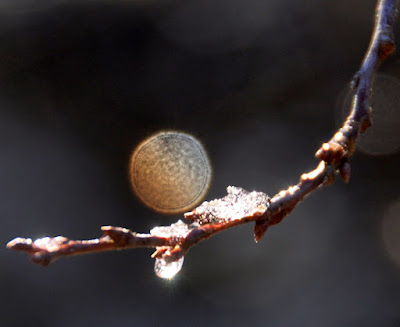Bokeh? Huh?
Wikipedia will tell you all about it HERE
I had planned to go outside and try to shoot some pictures with bokeh on purpose but we had a glorious almost all day rain yesterday so instead I perused my files for examples.
It's an interesting exercise, paying more attention to background than the main subject.
And scrolling through my files reminded me of how much there is to love about every season.
I make no claims for the quality of the bokeh in the following. . .
Thanks, Jim, for the new word -- and a new appreciation of background!

















18 comments:
I.LOVE.THAT.BUBBLE.SHOT!!! Great bokeh in all of them!
Thank you, Jim and Vicki for the new word. LOVE the bokeh in the shots. I'm going to pay more attention to f-stop and ...
Bubble shot is spectacular!
I agree, that bubble shot is fabulous! Thanks for the new word and all the bokeh. A new point of view!
Lovely pictures! I didn't know the word either.
It's a good word that seems to be changing its meaning somewhat. I have taken it to refer to points of light in the background as opposed to just general blurriness, but the latter definition seems to be taking over even if I think it's wrong.
The amount of blurriness can make or break the photo. In the one of the flowerbed that you find distracting, even more of a blur would fix that. Sometimes, the bg just smooths out into a non-distinct blur.
AnvilCloud -- that was what I thought at first but the various places I looked for a definition all seemed to go for the general blurriness.
Vicki, thank you for your visual-verbal blog. It's the only one I "read" everyday. Sometimes the balance is a bit to the verbal, sometimes to the visual and always just the best way to start my day.
Oh goodie, I have vocabulary to work on again. Unfortunately I don't know how to get my camera to give a bokeh when I want one...usually it's the subject I'm trying to focus upon which ends up all blurred.
Vicki, I like the way that you have explained bokeh...solving another Vicki Lane Mystery for us!
xo
Bokeh is achieved by using a wide aperture say 1.8 or 1.4 on a 50 mm prime lens. That provides a shallow depth of field. The higher the focal length of the lens the shallower depth of field. It makes your foreground really pop
Vicky, are you still shooting with your D90 and the 18-200mm (f/3.5-5.6) zoom lens?
Asks an admirer of your photography,
Merisi
The same, Merisi.
I love the droplets of water on the fall leaf! Wonderful! :-)
@ Vicki:
I guessed so. I asked because your photographs have always a really nice depth of field, whatever the subject. The bokeh of your close-ups really is lovely all the time. Great lens, great photographer!
I should have said "Great lens and great photographer" to avoid being misunderstood.
Praise from Merisi is praise, indeed!
The longer I look at your pictures, the more the praise they ought to receive!
Post a Comment